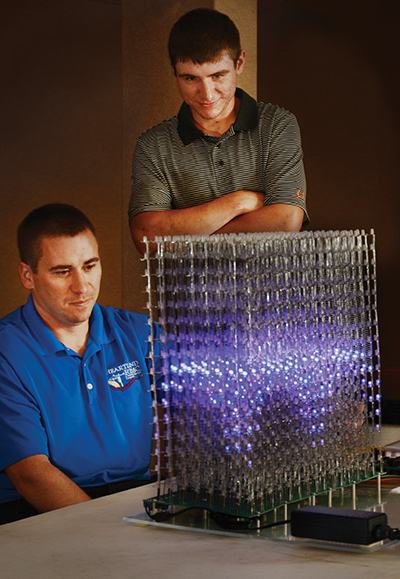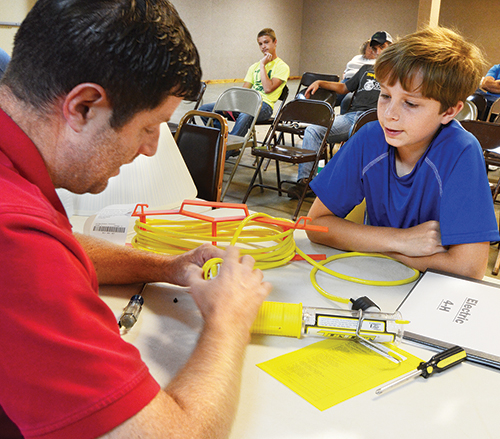
A solar-powered car zips away from the fingers of Mya Walters at the Boone County fairgrounds. The car, powered by a tiny photovoltaic cell, is a project in the Mini 4-H Electric program that her dad, Boone REMC lineman Matt Walters, helps lead. Mini 4-H gives kindergartners, first graders and second graders a head start learning about electricity and electronics.
Several years ago, leaders in the 4-H Electric program around the state started growing concerned about the decline in participation in the long-time program. To outsiders, the program was mostly associated with wiring a circuit on a plywood board and constructing extension cords and shop lights. Despite its endless energy and opportunities, considering it is “electricity,” it seemed to lack pizzazz.
“At both the county and state level there were conversations going on about the decline in interest,” said Rachel Olsen, the manager of marketing and communication at Heartland REMC, who serves on the state 4-H Electric program committee. “We were unsure of the reason but knew we had to do something or the program would eventually fade out from lack of interest.”
That’s when Angela Christopher, the Extension educator from Olsen’s home county of Wabash, contacted her about coming up with a small electric project that could be done by Mini 4-H’ers.
“She felt adding a Mini electric project might help increase interest in the Electric Club. The first year, we had over 50 kids build a snap together solar car,” said Olsen.
Mini 4-H takes the 4-H “learn by doing, hands-on” credo for youth in grades 3-12 to a younger level — boys and girls in kindergarten, first or second grade. It is designed to supplement and introduce younger grades to the 4-H programs they’ll be able to join as third graders. The program varies among the individual counties how and when it is implemented and what programs are available.
The success in Wabash County inspired Olsen to take their Mini 4-H Electric project to the state 4-H Electric committee, and a Mini 4-H Electric program was created that is beginning to spread statewide — with similar success.
Olsen reports an increase in regular club enrollment after the mini program began. In fact, electric program leaders from one REMC said they had one older sibling join the regular electric program after he saw the neat solar car kit his little brother put together.
Mini 4-H reflects an overall new emphasis 4-H in general is putting on expanding its reach and exploring new technology that’s out there at the fingertips of the youth.
“It’s fun to see how creative kids can be, not just putting them in a box, but letting them explore what they’re interested in with the electric program,” said Erika Bonnett, Extension specialist with the 4-H science initiatives at the Purdue Extension on the West Lafayette campus.
She said a new focus of 4-H is on continuing education and doing more than just a “project.” With 4-H Electric, for example, it’s linking careers in the electric and electronics industries. These are important careers in our increasingly technological world that need to be filled.
“The 4-H program, and specifically the 4-H Electric Program, have been a great way for the REMC to support the community,” noted Olsen. “Just this year, we have two 4-H’ers that were in the Electric Club all 10 years who have now gone on to work in the electrical industry. One is starting in the industrial electrician field, and the other is starting as an apprentice in the residential electrician field. Their experience with 4-H Electric gave them the background to pursue these careers.”
Here are some images from the Fulton County 4-H Electric program judging last month in Rochester.

Brayden Byers, front, reviews the mechanics of his switch project with judge Rachel Olsen, marketing and communication manager at Heartland REMC. All down the table, various aged 4-H’ers go over their projects with judges.





